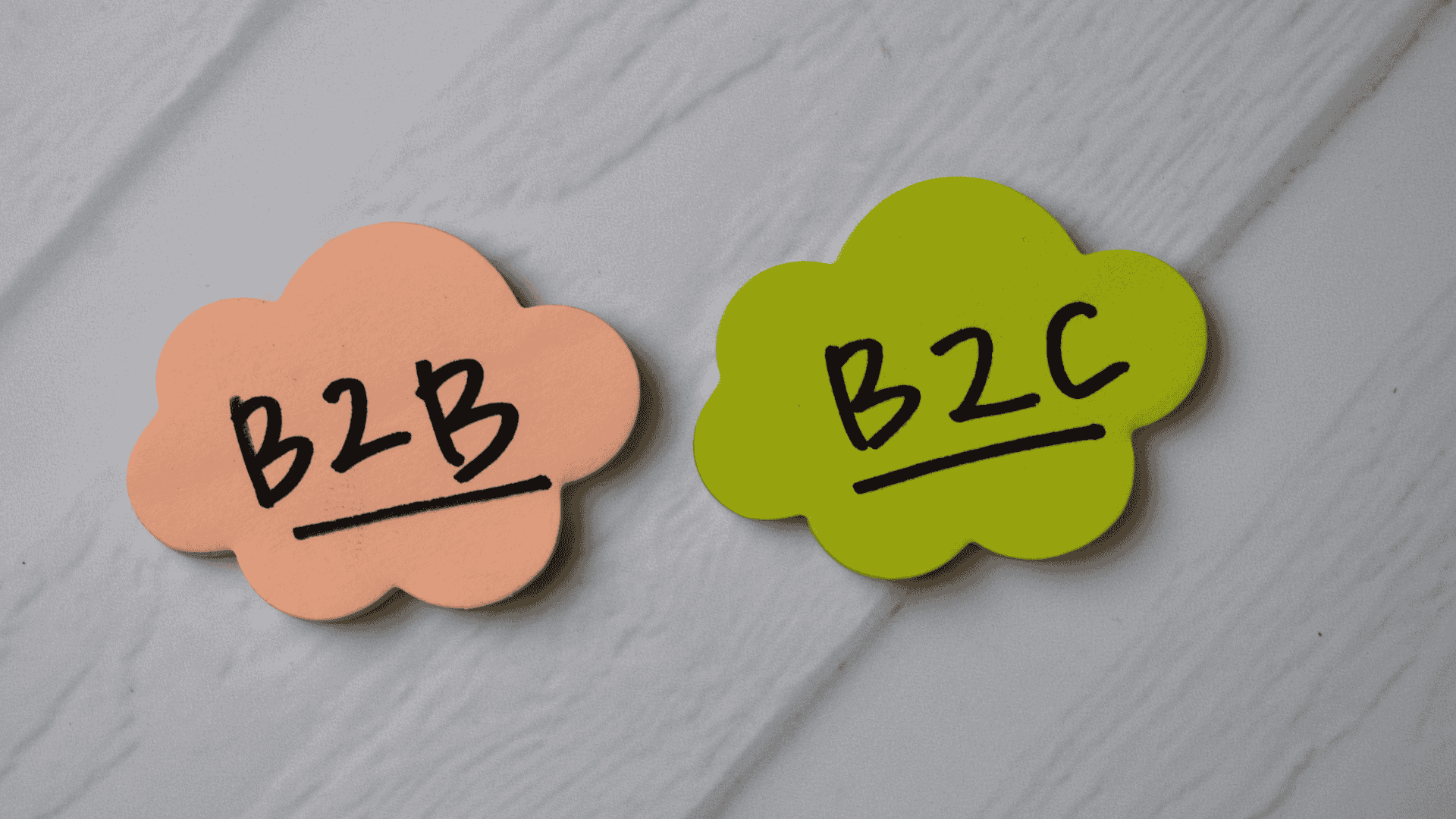Have you ever wondered, “What is B2B and B2C?” and why businesses market their products differently to companies versus individual shoppers? The answer lies in understanding these two key business models. B2B (Business-to-Business) and B2C (Business-to-Consumer) define how transactions happen, who the target customers are, and how marketing strategies are tailored.
Table of Contents
B2B businesses sell products or services to other businesses, often in bulk, with longer sales cycles and relationship-driven marketing. Think of a software company selling enterprise solutions to corporations. B2C businesses, on the other hand, cater to individual consumers with quick, emotion-driven purchases—like an online store selling clothes or gadgets.
Understanding the difference between B2B and B2C is crucial, especially in the world of e-commerce and digital marketing. From pricing strategies to customer experience, each model requires a unique approach. Whether you’re a business owner, a marketer, or just curious about how the commercial world ticks, understanding these models is key. Let’s break it down and explore what makes B2B and B2C so distinct—and why both are essential to the way we buy, sell, and thrive in today’s economy.
What is B2B?
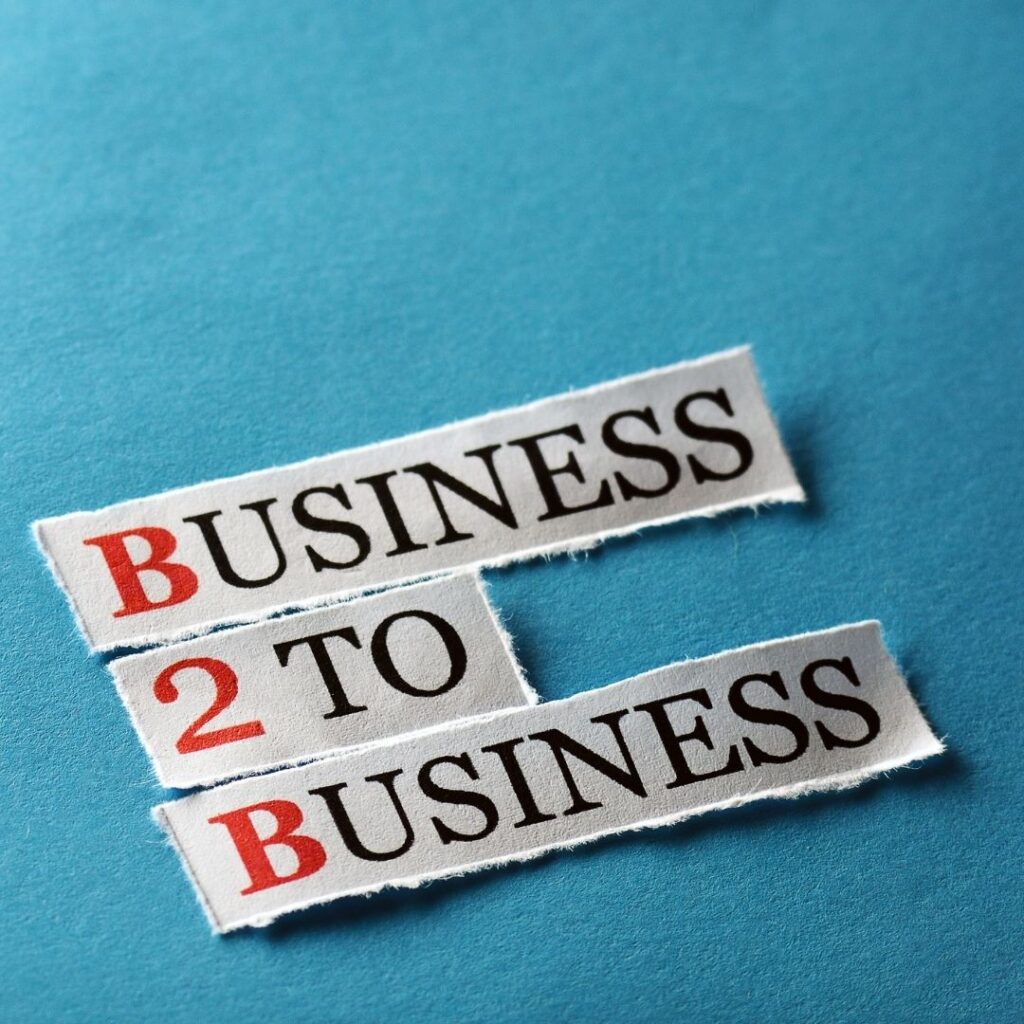
B2B means business-to-business, where a company offers products or services to other businesses. Unlike B2C, where companies sell directly to individual customers, B2B focuses on meeting the needs of other organizations. Think of a company that manufactures car parts selling to an automobile manufacturer, or a software provider offering tools to a marketing agency. These transactions often involve larger order volumes, longer sales cycles, and more complex decision-making processes. B2B relationships are built on trust, reliability, and long-term partnerships. Pricing is often negotiated, and contracts are common. The goal is to help other businesses operate more efficiently or grow their own operations. B2B isn’t about flashy ads or impulse buys—it’s about delivering value, solving problems, and building strong professional connections.
Popular B2B Business Models
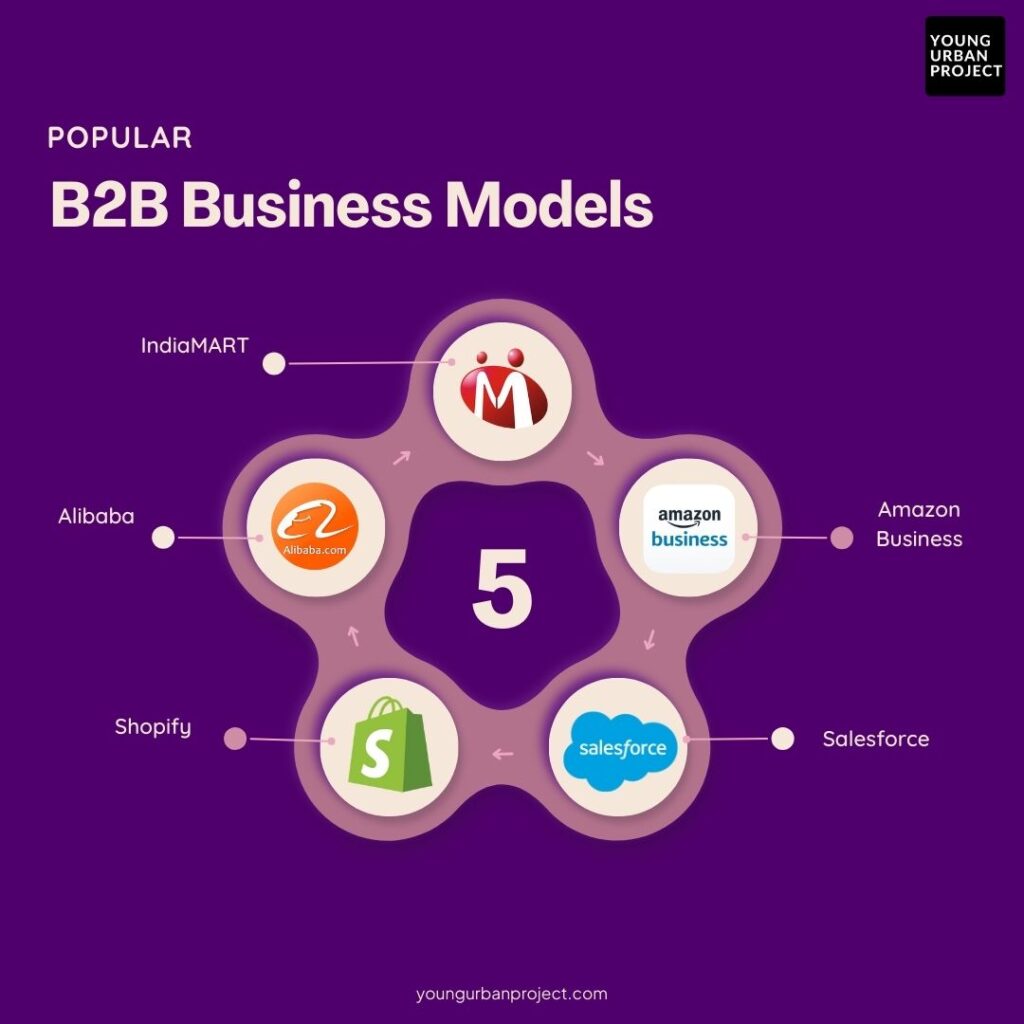
1. IndiaMART
IndiaMART is a big B2B platform in India. It helps businesses find suppliers, makers, and exporters. You can buy things in bulk, like industrial goods or raw materials. Buyers share what they need, and sellers give prices. It works for many fields like electronics, textiles, and machines. The site makes it easy for businesses to find what they need and grow faster.
2. Alibaba
Alibaba is a global B2B site from China. It links businesses with makers and sellers worldwide. You can buy bulk items at good prices. The site has safe payments, trade protection, and checks sellers. People use it for raw materials, electronics, clothes, and machines. Alibaba makes it simple for businesses to trade across the world.
3. Shopify
Shopify is a tool to build online stores. It works for both B2B and B2C sales. Businesses can handle stock, payments, and shipping in one place. It has ready-made designs and tools for marketing. Shopify Plus is for big companies that sell in bulk. It makes selling online easy for brands and wholesalers.
4. Amazon Business
Amazon Business is a B2B site for all company sizes. It gives bulk prices, tax-free options, and accounts for many users. You can buy office supplies, electronics, and industrial items. The site offers quick shipping, data tools, and special discounts for businesses. It helps schools, offices, and governments buy things easily and save money.
5. Salesforce
Salesforce is a cloud tool for businesses. It helps manage customer relations, sales, and marketing. Companies use it to track leads, automate work, and improve customer service. It gives smart insights using AI and works with other tools. Salesforce is for all business sizes. It helps them grow and connect with clients using data.
What is B2C?
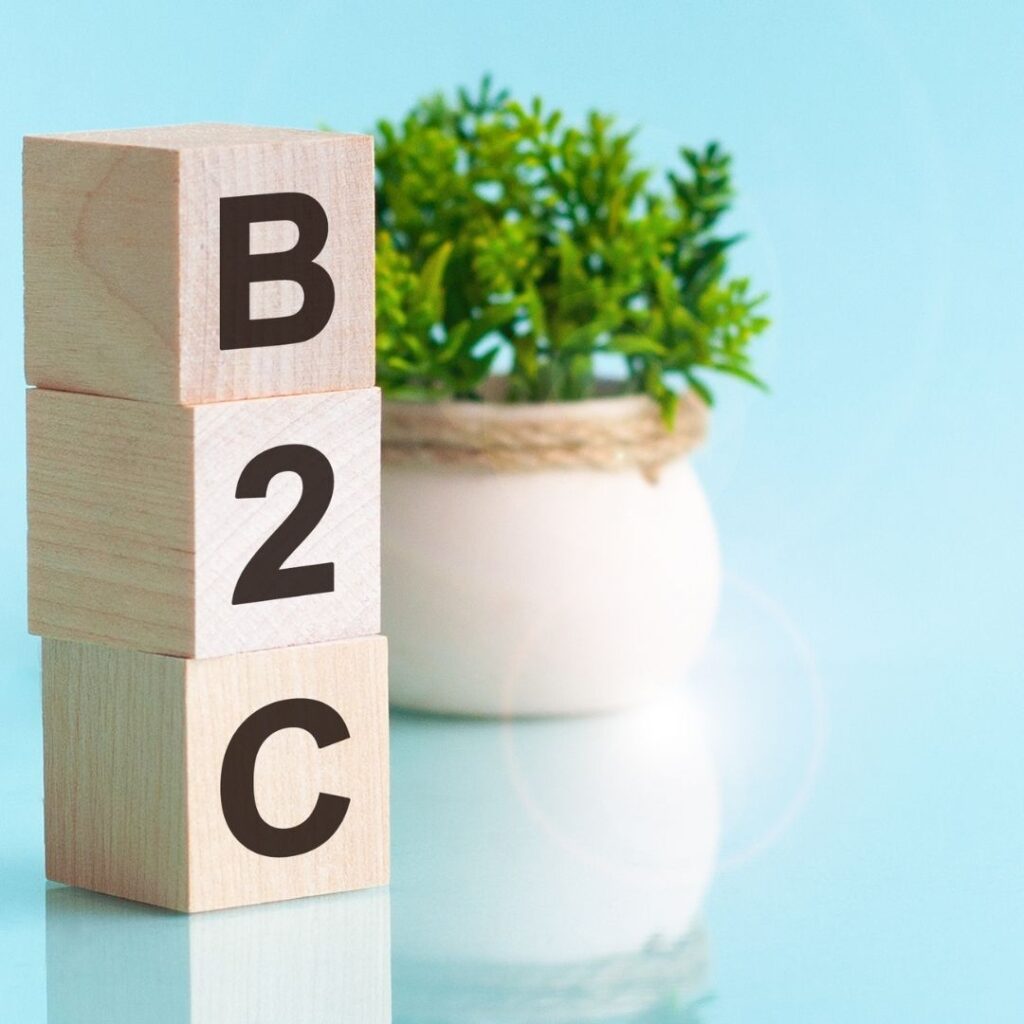
B2C, or business-to-consumer, refers to businesses that sell products or services directly to individual customers. Unlike B2B, which focuses on other businesses, B2C targets the end user. Examples include online shopping, streaming services, or ride-hailing apps. B2C transactions are usually simpler, faster, and driven by emotions or immediate needs. Marketing is often flashy and focused on creating a strong customer experience. The goal is to attract, engage, and retain individual buyers. B2C companies rely on branding, advertising, and customer satisfaction to build loyalty. From e-commerce platforms to entertainment services, B2C businesses are everywhere, making life easier and more enjoyable for consumers.
Popular B2C Business Models
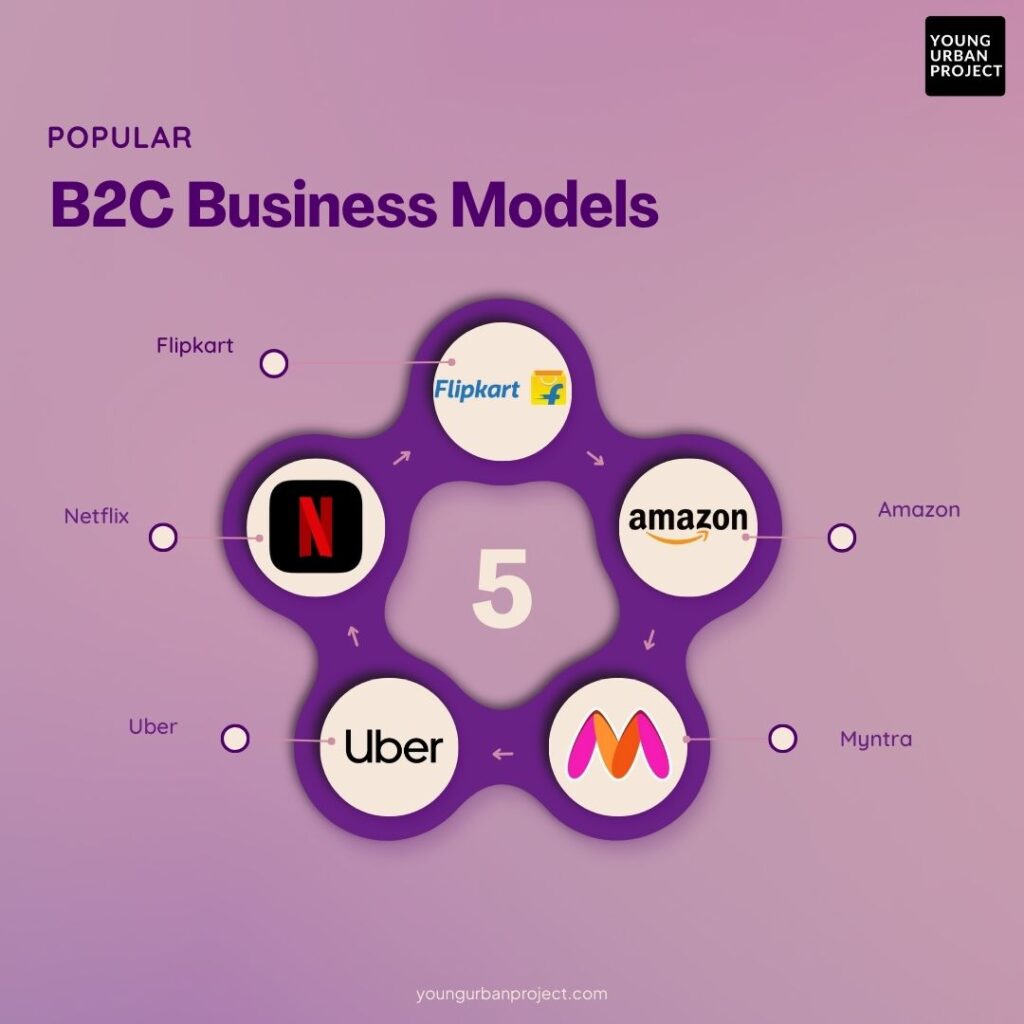
1. Flipkart:
Flipkart is a top online shopping site in India. It works by selling products directly to customers. You can buy electronics, clothes, home items, and groceries. It focuses on good prices and fast delivery. The app and website are easy to use. Features like cash-on-delivery and simple returns make it popular. It meets the daily needs of individual buyers. This makes it a clear example of a B2C business model.
2. Netflix:
Netflix is a global streaming service. It offers movies, TV shows, and its own content to users for a monthly fee. It works directly with individual customers. The platform is known for its ease of use and personalized suggestions. You can watch on many devices. Its focus is on keeping users hooked with quality content. This makes it a strong example of a B2C company.
3. Amazon:
Amazon is the biggest online store worldwide. It sells products directly to customers. You can find books, electronics, groceries, and more. It is known for fast shipping, like Amazon Prime. The site is easy to navigate. It gives personalized recommendations and good prices. Its customer-friendly policies make it a favorite. By focusing on individual shoppers, Amazon has changed how people shop online. It is a key B2C player.
4. Uber:
Uber is a ride-hailing app. It connects drivers with passengers. It works directly with individual users. The app lets you book rides, track drivers, and pay easily. It is known for being affordable and convenient. Uber focuses on safety and ease of use. It solves everyday travel needs for people. This has made it a global leader in the B2C space. It is a great example of a B2C service.
5. Myntra:
Myntra is an online fashion store in India. It sells clothes, shoes, and accessories directly to customers. The app and website offer a personalized experience. Features like virtual try-ons and style tips make it unique. It focuses on the fashion needs of individual shoppers. It also offers exclusive brands. This has made it a popular choice in India. It is a clear example of a B2C model.
What is B2B and B2C: Key Differences
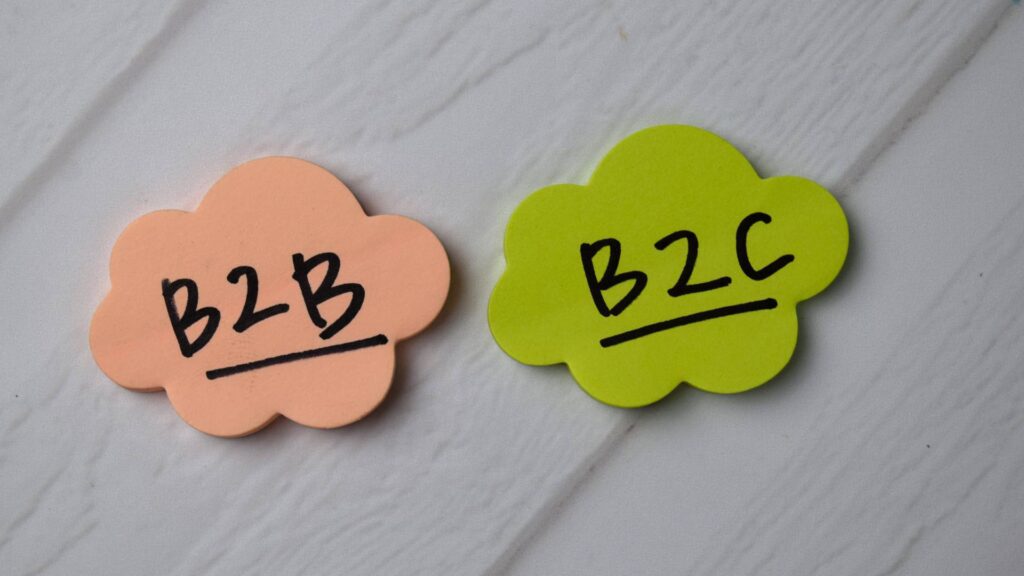
| Aspect | B2B (Business-to-Business) | B2C (Business-to-Consumer) |
| Definition | Business transactions between two companies. | Business transactions between a company and individual consumers. |
| Target Audience | Other businesses, organizations, and institutions. | Individual consumers and end-users. |
| Sales Process | Longer and more complex; involves multiple decision-makers. | Shorter and simpler; usually one decision-maker. |
| Purchase Volume | Large-volume purchases, bulk buying. | Smaller-volume purchases; individual or family needs. |
| Product/Service Type | Specialized products and services, often customized. | Standardized products and services designed for individuals. |
| Pricing | Negotiated pricing, often with discounts for bulk orders. | Fixed pricing, promotions, or discounts for individuals. |
| Sales Cycle | Longer sales cycle with more focus on relationship building. | Quick sales cycle with impulse or need-based decisions. |
| Decision-Making Process | Rational, data-driven, involves multiple stakeholders. | Emotional, personal, often based on immediate desires. |
| Marketing Strategies | Focused on building long-term relationships, content marketing, and lead generation. | Focused on mass marketing, advertisements, and emotional appeal. |
| Customer Relationship | Long-term, with ongoing customer support and partnerships. | Short-term, typically one-time transactions or repeat purchases. |
| Payment Terms | Flexible, often involving contracts, credit, or installments. | Immediate payment through cash, card, or digital wallets. |
| Examples | Alibaba, Amazon Business, Salesforce | Nike, Amazon, Netflix |
| Marketing Channels | Email marketing, webinars, trade shows, content marketing. | TV ads, social media, influencer marketing, online ads. |
Also Read: B2C vs D2C: Key Differences between e-commerce models
How do B2B and B2C Market Differently?
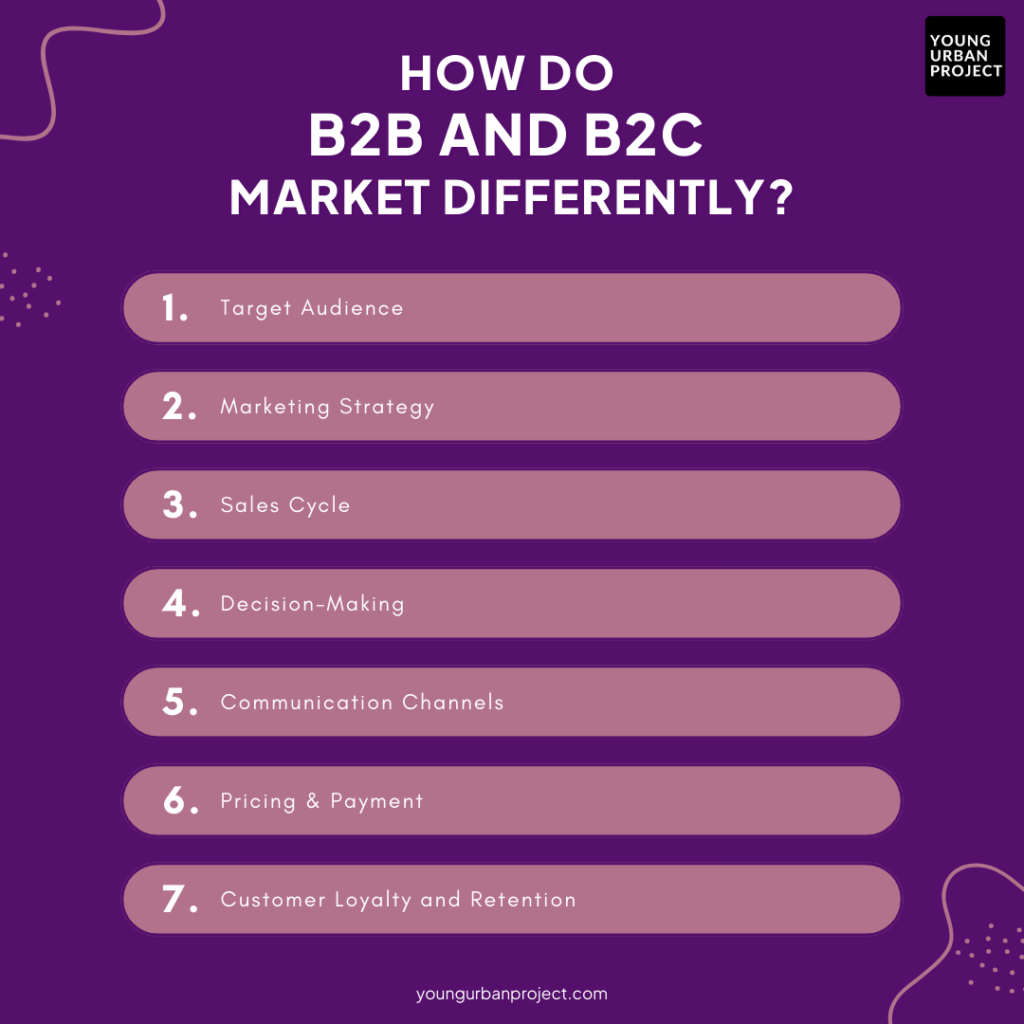
B2B and B2C market differently because of the distinct nature of their target audiences, sales processes, and goals. Here’s how:
1. Target Audience
- B2B: Markets to other businesses, focusing on their needs and requirements. The target audience is professional, and decision-making often involves multiple people or teams (e.g., procurement, executives).
- B2C: Markets to individual consumers. The focus is on personal desires, emotions, and immediate needs, with a simplified decision-making process often involving just one person.
2. Marketing Strategy
- B2B:
- Long-term Relationships: B2B marketing emphasizes building strong, long-term partnerships.
- Content Marketing: Detailed whitepapers, case studies, and product demonstrations that explain the benefits of products and services.
- Email Campaigns & Webinars: Engage in-depth with potential customers through educational content.
- Account-Based Marketing (ABM): Highly targeted strategies for specific companies or industries.
- B2C:
- Emotional Appeal: B2C marketing often relies on emotional triggers to prompt purchases. The focus is on lifestyle, personal aspirations, and convenience.
- Mass Advertising: Using broad platforms like TV, social media, influencer marketing, and online ads.
- Quick, Simple Messages: Short and catchy content that connects directly with consumer desires, often with immediate calls to action.
- Discounts & Offers: Promotions, seasonal sales, and deals to entice quick purchases.
3. Sales Cycle
- B2B: The sales cycle is long, often requiring months of negotiation, multiple meetings, and decision-making processes. The focus is on ROI (Return on Investment) and the long-term benefits of the product or service.
- B2C: The sales cycle is shorter. Purchases often happen impulsively or due to immediate needs. Marketing strategies aim to trigger quick decisions.
4. Decision-Making
- B2B: Decisions are more rational, involving multiple stakeholders (e.g., managers, financial officers, etc.). Buyers are focused on functionality, cost-effectiveness, and long-term value.
- B2C: Decisions are more personal, driven by emotions, desires, and lifestyle choices. Buyers look for convenience, price, and satisfaction.
5. Communication Channels
- B2B: Relies heavily on direct communication through email, LinkedIn, phone calls, and face-to-face meetings (especially for high-value contracts).
- B2C: Uses mass media, social media platforms (Instagram, Facebook), online ads, and retail channels to reach a wider audience.
6. Pricing & Payment
- B2B: Prices are often negotiable, with bulk discounts, long-term contracts, and credit terms. Businesses expect to negotiate pricing based on volume and long-term relationships.
- B2C: Pricing is usually fixed, with occasional discounts or sales. The focus is on consumer affordability and quick payments via credit/debit cards or digital wallets.
7. Customer Loyalty and Retention
- B2B: Building trust and maintaining long-term relationships is essential. The goal is often repeat business and strategic partnerships.
- B2C: While loyalty programs exist, the focus is more on customer satisfaction and repeat purchases, often through offers or brand loyalty.
Conclusion
In conclusion, B2B and B2C represent two distinct approaches to business. B2B focuses on selling products or services to other businesses, often with longer sales cycles and personalized solutions. B2C, on the other hand, targets individual consumers, emphasizing quick and emotional purchasing decisions. Both models have their unique advantages and challenges.
Understanding the difference between B2B and B2C is essential for tailoring marketing strategies, sales techniques, and customer interactions. While B2B marketing revolves around building strong, long-term relationships, B2C marketing is centered on creating instant appeal and customer satisfaction. Whether you’re working in a B2B market or B2C market, knowing how to effectively connect with your audience is key to success in today’s competitive digital landscape.
FAQs
1. What does B2B mean?
B2B means Business-to-Business. It is when one business sells products or services to another business. For example, a company selling software to other companies or a wholesaler selling goods to shops. B2B sales are often in large amounts. They take more time and involve discussions, contracts, and agreements between businesses.
2. What does B2C mean?
B2C means Business-to-Consumer. It is when businesses sell directly to individual customers. This happens in retail stores or online shops. B2C focuses on quick sales to people buying for themselves. The goal is to meet personal needs or wants. The buying process is fast, easy, and usually has fixed prices.
3. How do B2B and B2C differ?
B2B sells to businesses, while B2C sells to individual customers. B2B involves bulk sales, longer processes, and many decision-makers. B2C is about quick, emotional purchases for personal use. B2B builds long-term business relationships. B2C focuses on satisfying individual needs and making shopping easy and fast for customers.
4. Is B2B e-commerce more complex than B2C e-commerce?
Yes, B2B e-commerce is more complex than B2C. B2B deals with large orders, many decision-makers, and specific needs. The process is slower, with price negotiations and contracts. B2C is simpler, with one customer making quick purchases. B2C focuses on fast, easy transactions without many steps or discussions.

